Developing a Voice, Fine Tuning Scripts, and Getting Neurotic About Hair Color: An Interview with Marvel Comics Assistant Editor Xander Jarowey
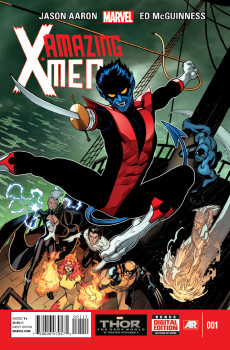
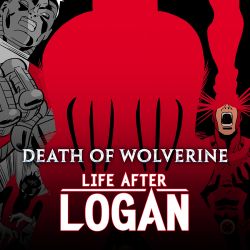 I recently interviewed Marvel Comics Associate Editor Jake Thomas, and now I’m having an e-conversation with Xander Jarowey. Xander is the Assistant Editor on All-New X-Men, Amazing X-Men, Uncanny X-Men, Guardians of the Galaxy and Legendary Star-Lord (all under Editor Mike Marts), Nightcrawler, X-Force and Magneto (under Editor Daniel Ketchum), and All-New X-Factor and Guardians Team-Up (for Editor Katie Kubert). He’s recently become the editor on Amazing X-Men and has also edited the Death of Wolverine: Life After Logan, and is the Editor of the upcoming X-Tinction Agenda.
I recently interviewed Marvel Comics Associate Editor Jake Thomas, and now I’m having an e-conversation with Xander Jarowey. Xander is the Assistant Editor on All-New X-Men, Amazing X-Men, Uncanny X-Men, Guardians of the Galaxy and Legendary Star-Lord (all under Editor Mike Marts), Nightcrawler, X-Force and Magneto (under Editor Daniel Ketchum), and All-New X-Factor and Guardians Team-Up (for Editor Katie Kubert). He’s recently become the editor on Amazing X-Men and has also edited the Death of Wolverine: Life After Logan, and is the Editor of the upcoming X-Tinction Agenda.
Thanks for taking the time for the interview, Xander. How long have you been with Marvel and how did you get in? Internship? Job application? Press gang?
Thanks for having me! My path to Marvel was circuitous. I moved to New York to work in theatrical management. I worked a few internships and had a ton of fun, but I came to a point where I wasn’t 100% sure that I wanted to stay in the industry. I’m a huge comics fan and Marvel has always had a special place in my heart. Maybe I should blame it on the X-Men cartoon?
I looked at the Marvel site on a whim and saw an editorial assistant job. It sounded a lot like what I’d been doing in theatre. I got an interview, but lost the job to Devin Lewis (who is now the assistant editor for Nick Lowe on Spider-Man). He doesn’t know it yet, but payback is coming one day. Marvel got in touch with me after the interview and asked if I’d be interested in interviewing for an assistant editor position. I had to hold in my fanboy squeal. They gave me a script and a day to give them notes. After that I went through a series of interviews and somehow hoodwinked them all into hiring me. It’s been a fantastic year and a half ago since then.
[Click the images for bigger versions.]
The editorial jobs sound like project management, but there’s an artistic component too. How did you find growing into the role of giving editorial notes to writers and artists? Is there really that much time for them to make adjustments if you’re looking for changes?
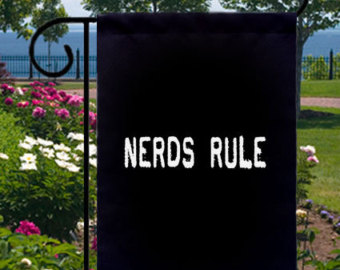
There’s a lot of project management, so it was helpful to have experience from theatre. The artistic component is probably the “fun” part though. That’s where we let our nerd flag fly a bit. In terms of growing into the role, part of it is just learning to be confident in your editorial voice.
When I first started out, it was more about getting my legs under me and learning the process. Once I started to become comfortable with that piece of the job, Editors Daniel Ketchum and Nick Lowe taught me the importance of developing my voice and having faith that I know the characters and what makes a good comic. Since I’ve started working with Mike and Katie, they’ve definitely reinforced this and encouraged me to really take part in the creative process.
That’s kind of the other half, just knowing the world these characters live in, knowing the characters, their pasts, their motivations. You want to make them feel as honest, as real, as is possible. For me, having that well of knowledge really just came from spending way too much time reading comics, haha.
When it comes to time for adjustments, that really depends on the project. Sometimes we have more lead time and more time to plan and fine tune an outline or a script. Sometimes you’ll end up in a jam because of one of a-million-and-one reasons, which means less leeway for planning. I would generally say that the vast majority of the adjustments are made while the writer is outlining the plot, either for an arc or an issue.
Other than that, it’s more often patching art for continuity or giving notes on layouts that artists send you. And of course the all-important color notes. I can be a little neurotic about things like eye color and hair color sometimes, I won’t lie to you. We always hit those time crunches where we have less time, but it’s our job as editors to make sure that those shortened schedules don’t affect the books’ accuracy when it comes to how the world and characters of the Marvel Universe are supposed to feel and look.

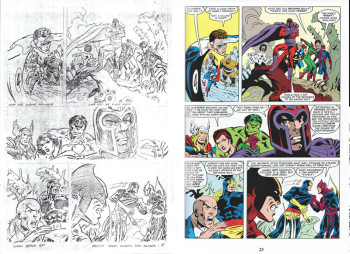
Every production process sometimes goes off the rails, and your job is to fix it. What would be the imaginary worst-case, train wreck scenario for you as an assistant editor and how would you fix it?
Oh man, hahaha, I’m a little scared to even think about that. I mean, we’ve run into some insane moments with books plenty of times since I’ve been here. I swear it’s not because I’m bad at my job. Books can be “on fire” for one of two reasons.
One, if for whatever reason a script comes in late, that can put us seriously behind the eight ball, because it makes the schedule tight for our artists, and even more so for our colorists, who I truly believe are the unsung heroes of comics. Even so, our artists often pull off miracles and we try to heap on them as much praise as we can when they save our butts.
The other side is if an artist gets off schedule for some reason. Maybe they were sick, or had a family emergency, or whatever it might be. Comics are an art, not a science, so we can’t expect everything to go as planned. It’s my job to anticipate all the possible pitfalls and at the very least mentally prepare myself to fix those potential errors.
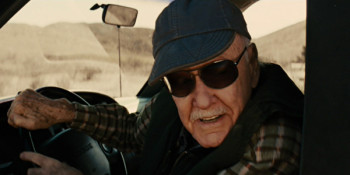
EXAMPLE TIME! So let’s say we’ve got a penciler who doesn’t ink themselves. They’re running super late, and the book is supposed to go out that week. This is when we go into triage mode. We’ll get multiple inkers to help out so we can get them done as fast as possible. As those are coming in we’ll have them sent directly to the colorist, or colorists if we need extra help on that.
The key is really to link everyone up and make sure they’re all on the same page and aware of whom is doing what and when it needs to be done by. If you develop an honest and trusting relationship with your freelancers, then when you hit these crazy moments, you’ll know you can count on them.
It’s like a Band of Brothers and Sisters in some ways, haha, and each time I send out one of those e-mails looping everyone in it feels a little bit like I’m giving them a “once more unto the breach” speech. It really just becomes a matter everyone stepping up a doing their job.
You work for three different editors, Marts, Kubert and Ketchum. Are the skills of an assistant editor so transferable that it’s easy to work for multiple editors, and if not, how do you adapt your styles and responsibilities?
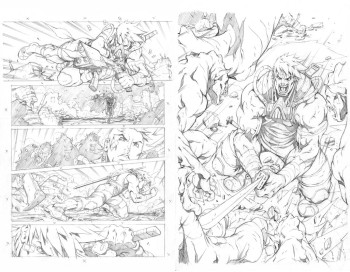
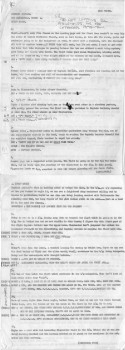
The skills are definitely transferable. For the most part, there are a fair amount of similarities in the basic everyday processes that we as assistants have to do. There’s not too many different ways you can get files sized and off to the colorist.
However, each editor has their own style, and it’s my job to feel out how I can best help them make the process as efficient as possible. This could range from something like forecasting out schedules so they can see any snags that might be coming up for a particular book to checking an artist’s layouts against the script.
Some editors will want you to jump on a plot or outline right as in comes in and give them any notes you have, and others may want your input later in the process when the plot is more fully formed. I mean, they’re people, and adapting to each editor is really about understanding their personality, their preferences, and their personal aesthetic.
It’s also about being honest and knowing what their strengths and weaknesses are. I’m there to fill in the gaps. I’m there as a second voice and someone that they can hopefully count on to think and act quickly when problems arise.
You’re currently assisting on titles with a range of voices and tones, from gritty noir to smart-assed fun to serious super-hero. Do have a sense yet of where the comfort zone of your editorial voice will be, any tones that you already find natural?
This is a tough one. I tend to pull from many different genres when I buy my own books, so it’s hard to say if I have a favorite. As much as I love big kick-ass superhero stories, I think my personal preference lies somewhere between gritty noir and smart-assed fun. Probably with a healthy dose of “character study.”
Who doesn’t enjoy a big X-Men fight, but my love for the X-Men is more linked with their innate outsider nature and how the books have explored a myriad of psychological and emotional issues. I really like delving into characters psyches. I want to know who they are, why they do what they do, where they came from and how it molded them into who they are today. This is probably why I’ve been enjoying Magneto so much. At the same time, I myself am a bit of a sarcastic, smart-ass with a tendency toward dark humor.
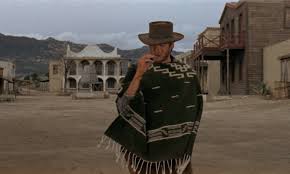

Which is most likely where my love of books like Legendary Star-Lord and Guardians of the Galaxy comes from. I’ve been a huge Guardians fan since the Abnett and Lanning cosmic run, so getting a chance to work on those books as well as my beloved X-Men has really been a dream.
But back to the question at hand, maybe this can help: start with a Leone western and throw in a little bit of Tarantino and some David Mamet. That’s the best I’ve got off the top of my head. I want gritty realism with a sarcastic smile. The real world can be a dark place, but sometimes you have to laugh a little at the absurdity of it all.
What books, comics, TV shows do you gravitate to and are these the same kinds of stories you’d hope to edit in the future?
Books are simple. I’ve always been a sci-fi/fantasy guy. I’ve read less books and more comics lately, as I like to pretend I’m doing research, but give me Ender’s Game or The Eye of the World and I’ll be a happy camper. In terms of Comics, I’m all over the map. I read a ton of super-stuff for work so my home reading leans far more toward indie books. There are a lot of amazing creator-owned books coming out that have given comics readers an immensely diverse selection of genres.
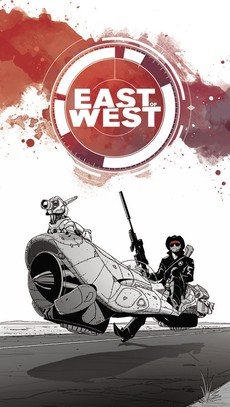 Honestly, I still find myself gravitating toward sci-fi or fantasy at times, whether it be Hickman’s East of West or Joshua Williamson’s Birthright, but that gritty realism will still draw me back with books like two of my personal favorites. Jason Aaron’s Southern Bastards and Rick Remender’s Deadly Class. And both of those books do a pretty great job, in different ways, of giving me that exploration of a character’s psyche that I love so much.
Honestly, I still find myself gravitating toward sci-fi or fantasy at times, whether it be Hickman’s East of West or Joshua Williamson’s Birthright, but that gritty realism will still draw me back with books like two of my personal favorites. Jason Aaron’s Southern Bastards and Rick Remender’s Deadly Class. And both of those books do a pretty great job, in different ways, of giving me that exploration of a character’s psyche that I love so much.
With TV, I will watch some of the superhero/sci-fi/fantasy shows, but I’m SUPER picky. When you’re used to the almost overwhelming world-building of someone like Robert Jordan, if a show like that doesn’t immerse me immediately, then I’m probably going to check out. Instead, I tend to watch a lot of comedies. But again, we’re leaning toward darker humor. South Park is my favorite show. Bob’s Burgers, Rick and Morty and Archer are along the same lines. I’m also a big fan of Louie. Community is up there with South Park. I love Dan Harmon.
The overall tone of the shows may vary, but I like that they don’t pull punches and are willing to find humor in almost anything. So my influences are somewhat varied, but when you put it all together I think it gives a fairly good idea of what I was getting at earlier. My personal aesthetic is an amalgamation of my favorite things, with a healthy dash of my own personality and outlook on life.
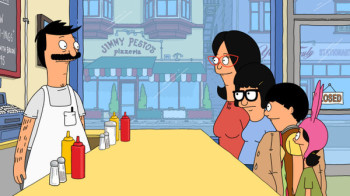
So, editors are custodians of characters, and in general, have to hand them back in a state in which they can star in other stories with other creative teams. But X-Tinction Agenda is an alternate future tale. Do you and the writer and artist have a lot more freedom with it, because, as an alternate world, you can come up with new endings that may not be seen as the status quo? And what made you sign up for this book and not some other?
I always hate saying this, but yes and no. No, because as much freedom as we have to play with the story and setting, the characters still need to feel like the characters that our fans know and love. Yes, they’ve changed in this timeline. They may be older and they may have had experiences that have changed who they are, but we still have to maintain the core, the spirit, of the character and any substantial changes made to them have to feel honest and earned.
On the yes side of things, of course we get more freedom! That’s one of the best parts. Taking a point in X-history and saying “what would have happened down the line if this thread had remained constant?” Marc is pulling all kinds of characters to fill out our cast, and Carmine has been more than happy to do some (frankly super cool) redesigns of those characters to fit our story. We’ve been working through some of them recently and man and I am stoked for people to see what Marc and Carmine have worked up.
The key here is finding that happy medium between building ourselves a story that feels fresh and exciting, while still evoking the nostalgia and love that fans have for the original story. I think Marc is doing a fantastic job at finding that groove. In this X-Tinction Agenda story, we have a status quo. It just isn’t the one that we’ve seen recently in the 616 universe. So it’s more of a question of making sure that we establish quickly, efficiently, and eloquently what our status quo is, and then we can turn, so the story naturally flows in a new direction.
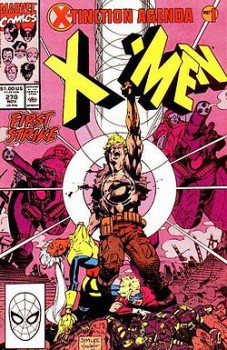
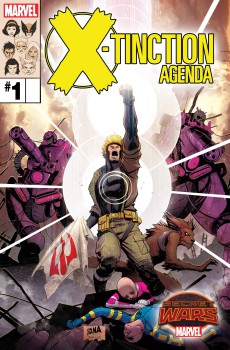 And when it came to signing up for the book, it was fairly simple. Marc wanted to do X-Tinction Agenda during Secret Wars. Mike said “Hey Xander, do you want to work with Marc Guggenheim on X-Tinction Agenda?” And I responded “I loved Young X-Men! Sign me up.”
And when it came to signing up for the book, it was fairly simple. Marc wanted to do X-Tinction Agenda during Secret Wars. Mike said “Hey Xander, do you want to work with Marc Guggenheim on X-Tinction Agenda?” And I responded “I loved Young X-Men! Sign me up.”
That was only kind of a joke. I do love Young X-Men. Plus the second that iconic Jim Lee cover to Uncanny X-Men #270 popped into my head I couldn’t say no (by the way if you haven’t seen David Nakayama’s homage cover, find it. It’s amazing).
But seriously, I wasn’t going to say no when given the opportunity to work with a writer like Marc. Since I started this project, he has been a joy to work with and incredibly open to collaboration. And he can write stuff pretty good, too. Throw someone like Carmine in the mix, who is an absurdly nice and talented guy, and the e-mail chains start looking like love letters.
Not much more I could ask for if I’ve got a team of talented, hardworking people who are just a pleasure to talk to. Simply put, this book is going to be a great balance of old and new. You’re going to get some really wonderful character beats, and of course you’ll have your 90’s style crazy battle scenes. I don’t think it will disappoint.
Thanks very much for the chance to chat, Xander! There’s a world of behind-the-scenes cool to comics and we appreciate seeing it.
I appreciate you having me! I hope my overly verbose diatribes didn’t put everyone to sleep, haha. When you get me talking about comics I tend to get a little overexcited. But that’s because comics are awesome. Thanks for taking the time to talk with me, and I hope everyone enjoys the awesome stuff that Marvel has coming! KEEP READING!
If you’d like to know more about Xander, he tweets at @XJarowey. If you’re curious about X-Tinction Agenda, there’s more info at Marvel and ComicBook.com.
Derek Künsken writes science fiction, fantasy and sometimes horror in Ottawa, Canada. He tweets @derekkunsken. His hard sf story “Way of the Needle” won the Asimov Award and you can listen to it for free at Escapepod.
I wish you had asked him why Marvel hates their characters so much, especially Spiderman.
Hey CMR! Hahaha. I didn’t ask it because I don’t think it. I know Marvel pushing the edges in their exploration of characters. Cap got old. Thor lost his hammer to someone else. Spiderman is following another unexpected path. A lot of readers were surprised by developments in Spiderman and much mail went Marvel’s way. I think that Marvel is giving their writers latitude to surprise their readers and pushing the edges of the whole “being custodians” thing with the properties Marvel owns. Sometimes going into new places makes the experience different for us (good or bad), but my absolute favourite Batman run was from Battle of the Cowl until Bruce Wayne came back. I’m sure that many readers stopped reading Batman for that period, but lots of others (me included) got on for the excellent Grant Morrison run.